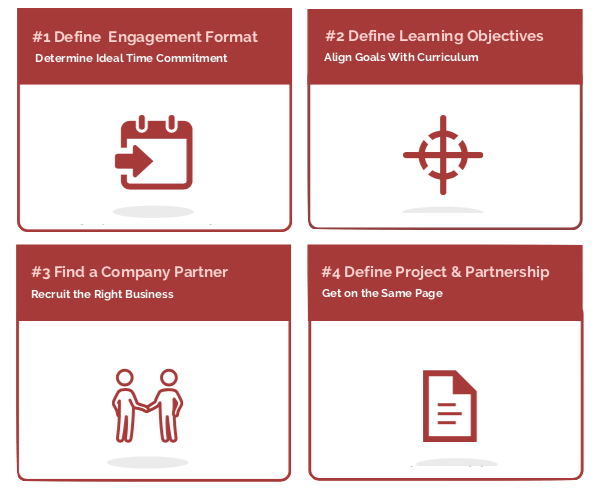
4 Steps to Integrate Experiential Learning in Your Course
School might be out for the summer, but if you’re thinking about refining your curriculum for next year, now is the perfect time to get started.
Professors who incorporate experiential learning into their courses report an increased rate of student engagement and learning. We coordinate dozens of hands-on collaborations with real companies for educators every year, so we thought we’d put together some recommendations for faculty interested in incorporating experiential learning into their curriculum for the first-time.
Define Your Engagement Format
- One-Day Engagements – Quick interactive sessions with real business professionals can be geared to help students develop a broad perspective on a business and industry in a short amount of time. These engagements should be designed to expose students to companies and their leaders and can often be done through panel discussions, guest lectures, site tours, Q&A sessions, and more. Example: CapSource’s Site Visits
- Short-Term Engagements – These collaborations can span a few weeks or a full semester and should incorporate a real, meaningful challenge from a real business directly into the curriculum. These are often used like a case study throughout a several week period and offer a way to deliver experiential learning to more students simultaneously. Example: CapSource’s Live Business Cases
- Intimate, Semester-Long Engagements – With longer-term projects, students can work in small teams as outside consultants directly with company leaders on real, valuable deliverables. Through these experiences, students gain in-depth exposure to different business functions, roles, and responsibilities. Example: CapSource’s Capstone Projects
Define Learning Objectives
- Decide which technical areas and soft skills you’re looking to develop in your students. For example, do you want students to learn how to assume the role of an outside consultant, understand how two different departments interact, and improve their public speaking and presentation skills? (We’d recommend a Capstone for that!) Also, ensure that your engagement goals align with your overall course learning objectives in order for the outcomes to be most meaningful to everyone.
- Determine the project duration, expected time commitment, and deliverable guidelines. Use a detailed explanation of these goals and guidelines as part of your company recruitment package and to help the students understand what they’re expected to do and how they’ll be assessed.
Find a Company Partner
- Establish criteria of an ideal company partner based on size (Fortune 1000 to Start-Up), revenue, stage, industry and geographic location.
- Create a company recruitment package. Include a one-page summary of the course and the objectives of the experiential learning engagement. It’s also particularly helpful to have these resources available online.
- We recommend leveraging career service centers, alumni network, small business development offices, entrepreneurship centers, or local chambers of commerce whenever possible.
Finalize Project Goals and Partnership Agreement
- Project Charter – Get everyone on the same page! After you find a matching company, design a project charter that outlines the goals for the engagement. Elements of a good project charter include a business challenge, suggested process for students to follow, detailed list of any necessary resources, communication guidelines, and timeline for the engagement.
- Legal Agreements – This is an ideal time to prepare any preliminary paperwork such as NDAs or other legal agreements (like IP Assignments) required for students and faculty to participate
Ready to get started but don’t have the time to go searching for companies? CapSource has a Directory for educators where they can find host companies interested in participating in the education process through experiential learning.
Capsource develops and delivers high caliber experiential learning engagements for schools.
Want to learn more? Contact [email protected] today to see how our platform can help you and your students.

